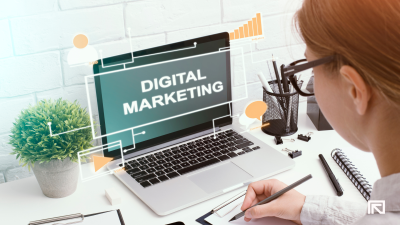As a marketer, keeping up with the latest trends is crucial. One major development is the use of artificial intelligence (AI). AI technologies like machine learning, natural language processing, and predictive analytics are changing how businesses connect with customers, run campaigns, and achieve growth.
This article explores the many benefits AI brings to digital marketing. These include improved customer personalization, optimized content creation, better ad targeting, and automation of repetitive tasks. AI tools help marketers gain deeper insights into customer behavior, make smarter decisions, and boost return on investment (ROI).

What is AI in marketing?
AI involves using artificial intelligence technologies to automate marketing decisions based on data collection, analysis, and observations of audience behavior or economic trends that affect marketing activities.
AI is particularly useful when speed is critical in marketing campaigns. By analyzing data and customer profiles, it learns how to interact effectively with other systems and people. This allows AI to create personalized messages at the right time without human intervention.
Many modern marketing consultants use AI to handle specific tasks that don’t require much human touch. This helps ensure that marketing activities are efficient and effective, freeing marketers to focus on more strategic aspects of their campaigns.
Evolution of AI technologies
AI has come a long way since the mid-20th century. Initially, AI systems were simple and rule-based, but they have evolved into sophisticated entities capable of deep learning and predictive analytics. This significant transformation has been driven by the rapid growth in computational power, access to large datasets, and advancements in machine learning algorithms.
In recent years, groundbreaking technologies and platforms from major tech companies have reshaped AI. A prime example is OpenAI’s ChatGPT. Built on the GPT (Generative Pre-trained Transformer) architecture, ChatGPT excels at generating human-like text, making it invaluable for applications like customer service and content creation.
Microsoft has also made significant advancements in AI, particularly through Bing Chat, which is integrated with ChatGPT 4.0. Unlike ChatGPT, Bing ChatGPT benefits from its access to Bing’s search engine, allowing it to provide more current and reliable answers by referencing up-to-date sources. This integration enhances its reliability and fully utilizes Bing’s search engine capabilities.
Another major development is Google Bard, which highlights Google’s commitment to AI research and development. Google Bard uses extensive data and advanced AI algorithms to deliver insightful, contextually relevant information. This enhances the capabilities of search engines and information processing, making it a significant tool in the AI landscape.
These advancements show how AI has evolved to become a critical component in growth marketing, offering powerful tools for data analysis, customer engagement, and personalized messaging.
Eight ways AI makes things better at the customer level
AI marketing revolutionizes how businesses interact with customers, providing numerous advantages that enhance customer experience and drive engagement.
In 2024, AI technologies offer advanced tools for personalization, real-time assistance, data-driven decision-making, and efficient content management.
These innovations ensure that marketing strategies are more effective and tailored to individual customer needs, fostering stronger relationships and higher conversion rates.
1. Social media management
Social media is constantly changing, and AI-driven tools excel at monitoring, analyzing, and responding to trends. AI can analyze social data to identify sentiment, track brand mentions, and gauge audience reactions. This real-time analysis allows marketers to quickly adapt strategies, respond to customer feedback, and capitalize on trending topics to enhance brand visibility.
2. Better customer personalization
Personalization is crucial in digital marketing, and AI elevates it significantly. In 2024, AI algorithms analyze customer behavior, preferences, and past interactions to deliver highly personalized content and recommendations. Customizing email campaigns, website content, or product suggestions, AI ensures that every customer interaction feels unique and personalized. This level of personalization builds stronger connections and increases conversion rates.
3. Voice search optimization
With the rise of voice-activated devices, optimizing for voice search is essential. AI is crucial in understanding natural language queries and providing relevant results. Marketers must adapt their SEO strategies to include conversational keywords and long-tail phrases that align with people’s speech, ensuring visibility in voice search results.
4. Predictive analytics
Data is essential, and AI-driven predictive analytics transforms its use. Predictive analytics algorithms forecast future trends, identify potential leads, and optimize marketing strategies based on historical data. By using predictive insights, marketers can make informed decisions, allocate resources more effectively, and stay ahead of market changes, resulting in more impactful and efficient campaigns.
5. Content creation
Marketers constantly struggle to create engaging and relevant content. However, with AI’s natural language processing capabilities, content creation is now more manageable. In 2024, AI tools can generate compelling copy, create social media posts, and even draft blog articles. While human creativity remains essential, AI complements it by automating routine tasks, allowing marketers to focus on strategy and creativity.
6. Conversational marketing
The era of advanced chatbots has arrived. AI-powered chatbots in 2024 are sophisticated conversational agents that understand context, provide instant responses and even complete transactions. They improve customer engagement by offering real-time assistance, answering queries, and guiding users through buying. Integrating these chatbots into your international marketing strategy ensures 24/7 availability, enhancing the overall user experience.
7. Programmatic advertising
AI has revolutionized programmatic advertising by optimizing how ads are bought and displayed. In 2024, AI algorithms will analyze user behavior and engagement patterns in real-time, optimizing ad placements and targeting to maximize return on investment (ROI).
8. Email marketing
Email marketing remains a powerful tool, and AI adds a new level of sophistication. In 2024, AI can analyze user behavior to craft personalized email campaigns, predict the best times to send emails, and recommend dynamic content based on individual preferences. This personalization increases engagement and strengthens connections with your audience.

Four types of AI tools
AI Tools enhance various aspects of your marketing strategy. Marketers can use these advanced tools to create more personalized and effective marketing campaigns, build stronger customer relationships, and drive better results. Here’s a breakdown of its key features with examples of real tools:
1. Customer engagement tools
Building strong customer relationships is key to successful marketing. AI Tools for Marketers offers tools that analyze customer interactions and provide insights into their preferences and behaviors.
- HubSpot: Personalizes marketing messages and offers to individual customers based on their behavior and preferences.
- Intercom: Uses AI-driven chatbots and support tools to provide timely and personalized assistance.
2. Content tools
Creating engaging content is vital for effective marketing. AI Tools for Marketers offers advanced content generation tools that use natural language processing (NLP) to produce high-quality text that matches your brand’s voice. Examples include:
- ChatGPT: Generates ideas and drafts blog posts that are both engaging and informative.
- Jasper: Helps create concise and impactful social media updates tailored to each platform.
- Copy.ai: Develops attention-grabbing video scripts that convey your message effectively.
3. Social media management tools
Maintaining a strong social media presence requires consistent effort. AI Tools for Marketers simplifies this with tools that automate and optimize social media activities.
- Hootsuite: Plans and schedules posts across multiple platforms to maintain a consistent presence.
- Buffer: Tracks engagement metrics to understand what content resonates with your audience.
- Sprout Social: Determines the best times to post for maximum visibility and impact.
4. SEO tools
SEO is essential for driving organic traffic. AI Tools for Marketers provides tools that analyze your website’s performance, identify relevant keywords, and offer actionable SEO recommendations.
- Moz: Optimizes on-page SEO by improving content, meta tags, and structure to enhance search engine rankings.
- Ahrefs: Identifies opportunities for high-quality backlinks to boost domain authority.
- SEMrush: Tracks keyword rankings and site performance to ensure ongoing optimization.

Use AI wisely!
The ongoing evolution of AI is transforming how businesses engage with customers and manage campaigns. Integrating AI has significantly changed marketing as these tools have revolutionized personalized customer experiences, efficient ad targeting, and content creation.
The benefits of AI include deeper customer insights, enhanced personalization, automation of repetitive tasks, increased ROI, and the ability to make real-time decisions.
As AI advances, it will provide even more sophisticated tools for marketers to understand and engage with their audiences.
Looking to the future, it’s clear that AI will become an increasingly vital part of businesses, giving them a competitive edge.





